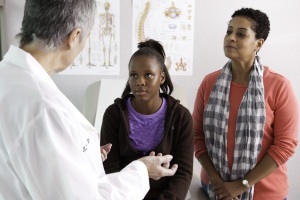
Bodily Autonomy
In every person’s life, there comes a time when you are autonomous, able to make your decisions on your own. We have all made both good and bad choices in our lives and have faced the consequences, good and bad. One of the biggest questions in my mind is at what age does that happen? As a mother of four(yes, four) teenagers ranging from 14-18 in age, I have often wondered when do you allow them to start making decisions that may effect their lives for a long time?
I remember the first time I let my sons go into a men’s restroom for the first time without their father. I stood outside the door, counting the minutes and scrutinizing any man that entered or exited the restroom. I remember making the three boys go into together, and making them promise not to leave each other alone. This is a normal scenario. It is a step every boys mother must eventually make.
As parents, we have always been the ones to make all decisions in the home. Those choices included entertainment, healthcare, schooling, clothing, food and many others. Letting some of those decisions be made by the teens is sometimes hard, but I believe are necessary to raising healthy, confident young adults.
When do your teens become mature enough to visit the doctor’s office by themselves? My 17 year old son recently had strep throat and I accompanied him into the doctor’s office. When a child has a serious illness, such as an eating disorder, is it ok for the doctor to refuse to allow parents in or to give information to the parents? If so, at what age? Eating disorders are often duel-diagnosed with another mental disorder, such as depression, anxiety, or OCD.
Success in treating eating disorders vary greatly. Factors include needs of the individual, severity of other diagnosed illnesses, type of treatment, willingness of the individual to embrace treatment and the family or social support network. (Eating Disorders, n.d.) People with eating disorders need nutrition education, and medical and psychological care.
In my research I found that those with a strong support system tended to have more long term success.(The Family-Based, or Maudsley Treatment Approach. n.d.) I believe that a strong family/social support system a key in recovery from eating disorders. If the teen with an eating disorder has a supportive family, doctors and psychologist will benefit having everyone involved in the care of the patient. Parents need to be involved in the health of their children.
References
Eating Disorders. (n.d.). Retrieved August 18, 2014, from http://www.nimh.nih.gov/health/topics/eating-disorders/index.shtml#part5
The Family-Based, or Maudsley Treatment Approach. (n.d.). Retrieved from http://www.feast-ed.org/TheFacts/MaudsleyApproach.aspx
This is a great topic and intro, I love how you speak about how we have to raise our kids to be independent and start doing things for themselves...the prevalence of eating disorders is probably so underreported. I think parents have children that are picky eaters that turn into preteens or teens with disorders. An interesting blog post could be just that topic, when does it switch from picky to disorder? I know a 15 year old who LITERALLY only eats steak, french fries, pizza, cheerios and bananas. Does this lead to some brain abnormality that could create mental illness or cognitive or learning issues? I know picky eater adults who get illnesses such as gout and IBS by age 35, due to diets high in fat. Such a complex topic, look forward to reading this blog.
ReplyDeleteHaving raised a daughter I have always felt bad that women have such incredible social pressure for their appearance. I always tried to help my daughter build self esteem so her self image was not reliant upon others opinions. I think its only when girls start feeling good about themselves for who they are will this eating disorder issue start to reduce.
ReplyDelete